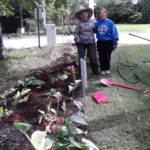Good Friday
The 20th of March was the first day of spring. The UN declared it ‘Happiness Day” for the whole world. Happiness Day. I wondered how the men, women and children in the refugee camps in the Middle East or the immigrants in interments camps in different countries or the hungry and homeless of the world celebrated Happiness Day.
What is happiness? The song tells us it is different things to different people. People can be happy because of the birth of a baby, a new job, a new friend, a raise, good news from the doctor. People are happy for any number of reasons.
A few years ago I was on a panel on the radio with a rabbi, and a Hindu priest. We were supposed to discuss the notion of happiness. For whatever reason the rabbi and the Hindu priest never showed up. It was a half hour program and the interviewer and I had to wing it.
The Holy Spirit helped me on that day. It dawned on me that happiness is not an end in itself. Happiness is a by-product of the way we live our lives. Self centered, self-absorbed people are never happy. They are wrapped up in their own concerns and worries they have no interest in the needs of others. For them it is all about what I want, what I need. You may have heard the story of the man talking with his friend who says ‘enough about me, what do you think of me? I suspect he was not a happy person, he needed to be the centre of attention.
Happiness is a by-product of how we live our lives. I suspect that doctors without borders are happy men and women. They are overworked, under lots of stress, working in dangerous places but when all is said and done they are happy men and women knowing they are doing good for other people. Volunteers in soup kitchens and food banks, people who deliver meals on wheels, volunteers in their blue smocks at NYGH, volunteers who drive cancer patients to treatments and many others who help others are happy people because they do their best to be there for other people in need. Hopefully most priests are happy persons especially if they are trying to be the kind of priest Pope Francis is calling for; priests who are close to their parishioners.
In the course of this radio program I remember some of the words of the prayer of St. Francis; where there is hatred, let me sow love, where is injury pardon, where there is doubt faith- for it in giving that we received, in pardoning that we are pardoned and in dying that we are born to eternal life. I suggested to those listening to the program that they would know happiness if they prayed and lived the prayer of St. Francis every day.
We just heard the words of Isaiah – surely he has born our infirmities – he was wounded for our infirmities, crushed for our iniquities and by his bruises we are healed. We’ve heard the passion narrative of John recounting the trial, the flogging, the crowning with thorns, the journey to his place of execution, Jesus being nailed to the cross and lifted up to be ridiculed and taunted by his enemies, his cries from the cross and his surrender into his father’s love – it is finished.
St. Paul, in his letter to the Romans writing about the death of Jesus tells us that ‘At the appointed time, when we were still sinners, Christ died for us godless men and women. Paul goes on to say, ‘it is rare that any one should lay down his life for a just person, though it is barely possible that for a good man someone may have the courage to die. It is precisely in this that God proves his love for us; that while we were still sinners, Christ died for us. Christ died for us – for you – for me –
Happiness is the by-product of how we live our lives. With all the pain and suffering we just heard about can we imagine that the Friday we call good was the happiest day in Christ’s life? For it is in dying we are born to eternal life ..in dying Christ came to the glory of his resurrection
Happiness can be ours, will be ours when we live out our relationships as Christ lived his – being there for those in need – reaching out to heal hurts, forgive wrongs, accepting and respecting men and women different from ourselves, trying as best we can to live the great commandment – love one another as I have love you. Later as you come to venerate the cross pray for the generosity you need to always be there for those who need you. May we be blessed with a happy Good Friday.
 Founded by St. Paul of the Cross, every Passionist takes a special vow to spend his or her energies in promoting remembrance of the sufferings of Jesus, the memory of the Cross, and reflection of the meaning of the Cross for the world.
Founded by St. Paul of the Cross, every Passionist takes a special vow to spend his or her energies in promoting remembrance of the sufferings of Jesus, the memory of the Cross, and reflection of the meaning of the Cross for the world.




